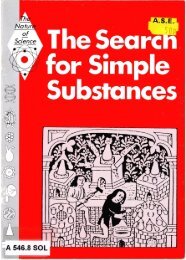Louis Pasteur by Nicola Kingsley - National STEM Centre
Louis Pasteur by Nicola Kingsley - National STEM Centre
Louis Pasteur by Nicola Kingsley - National STEM Centre
You also want an ePaper? Increase the reach of your titles
YUMPU automatically turns print PDFs into web optimized ePapers that Google loves.
26<br />
I<br />
Cha~ter 5<br />
Farmyard microbes<br />
Without a clear idea of what caused diseases,<br />
people could not control them or treat them<br />
effectively. Some things, however, were well<br />
known. One was that disease could spread<br />
between people or animals. Another was that if you<br />
survived certain diseases, such as chicken pox or measles,<br />
you were unlikely to have them again. By having it once,<br />
you developed immunity (protection against catching that<br />
disease).<br />
At the end of the 1700s, an English doctor, Edward Jenner,<br />
had developed a way of giving people immunity to a<br />
disease called smallpox. It was a very widespread and<br />
terrible disease, which killed many of its victims. Those<br />
who survived were often left covered in pockmarks-deep<br />
scars on their faces and bodies left <strong>by</strong> the septic blisters<br />
that were one symptom of smallpox. Many also lost their<br />
eyesight.<br />
It was common knowledge among country people that if<br />
you caught cowpox, a disease which normally afflicted<br />
cattle, you would not catch smallpox. Cowpox was not a<br />
particularly dangerous disease for people to have, so<br />
Jenner tried deliberately infecting people with it, in order<br />
to save them from getting smallpox. He did this <strong>by</strong><br />
injecting them with infected matter taken from the sores of<br />
people who already had cowpox. He called his method<br />
"vaccination"-from the Latin word for a cow, "vacca". It<br />
worked, but Jenner had no idea why.<br />
<strong>Pasteur</strong> wondered if vaccination could only be used to<br />
prevent smallpox, or if it might work with other diseases.<br />
An accident answered his question. In 1879 he was

















